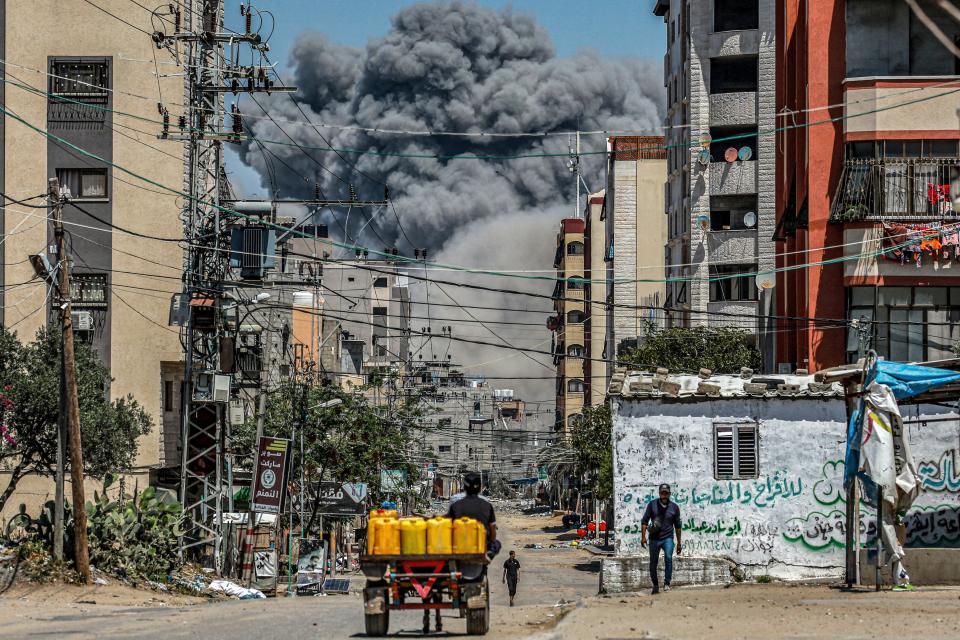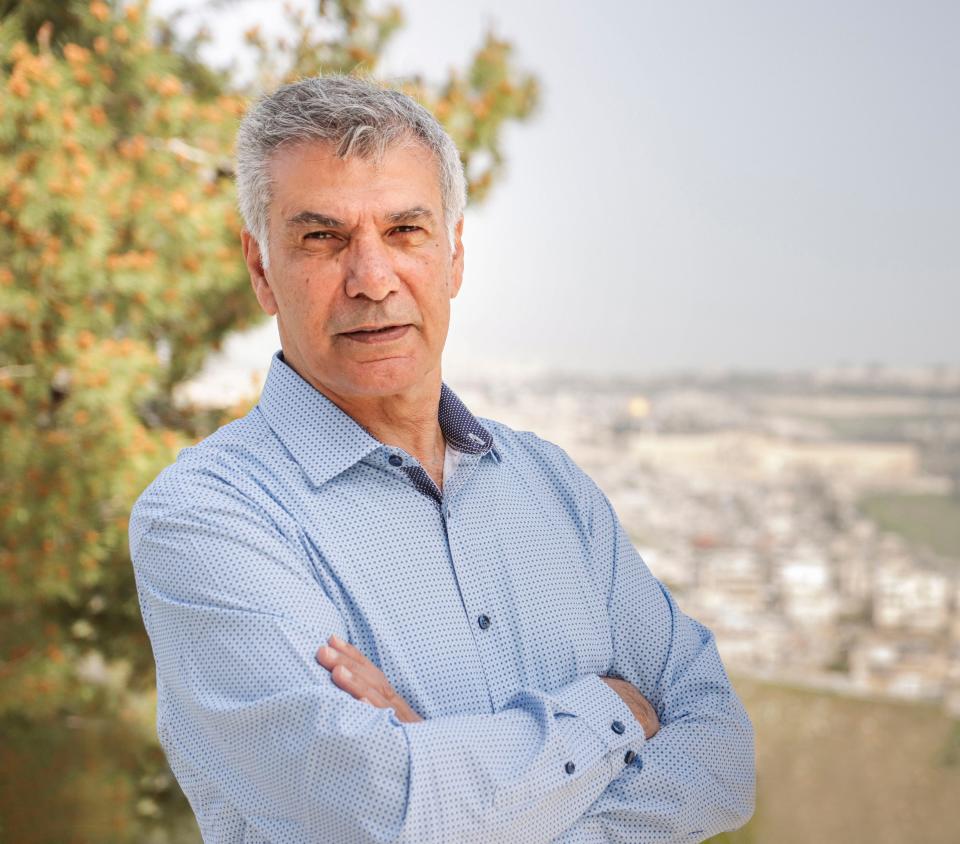Absolving Hamas from responsibility must end for the sake of Palestinians and Israelis
Hamas’s Oct. 7 heinous attack on Israel unleashed a devastating war, plunging Gaza into a catastrophic crisis. The war has returned the global conversation over Israel and Palestine to the fore, with ongoing public outcry and diplomatic discourse in the Western World seeking to force the implementation of a two-state solution.
Western discourse consistently overlooks several critical truths about Hamas, one of the two major Palestinian political powers. Hamas openly endorses a genocidal agenda, as explicitly stated in its official Charter, demonstrated at their September 2021 meeting titled “The End of Days,” and manifested in the violence of the Oct. 7 attack. Yet, Western circles fail to hold Hamas accountable for its actions. Equally ignored is the fact that many Arab nations do hold Hamas responsible for its actions.
Palestinian Authority President Mahmoud Abbas, the leader of Hamas's main rival, Fatah, stated, “Hamas is responsible for the greatest catastrophe of the Palestinians since 1948.” That sentiment is widely echoed throughout the Arab world.
Arab criticism of Hamas focuses on:
Hamas’s forceful takeover of Gaza causing an unbridgeable rift among the Palestinian people
Hamas's strategy of "armed resistance" bringing a repeating cycle of widespread death and destruction in Gaza
Hamas sacrificing the lives of its Palestinian brethren for the geopolitical imperialistic ambitions of its masters in Tehran
Hamas’s desire to destabilize Arab countries by fomenting dissent and protest to force other Arab nations to rescue it from the war it launched against Israel
Absolving Palestinians and their leadership from accountability plays into the hands of Hamas, Islamic Jihad, and the Iranian regime, all of whom seek to perpetuate and escalate the conflict to foment further instability in the region and to advance Iran's imperialist ambitions at the expense of the Arab states. Major Arab states — including Egypt, Jordan, Saudi Arabia and the UAE — view Hamas and Islamic Jihad as threats to their own national security. These countries, along with Egypt and the UAE, categorize Hamas’s parent organization, the Muslim Brotherhood, as a terrorist group. Egypt actively pursues Islamic Jihad and Muslim Brotherhood activists, Saudi Arabia arrests Hamas's affiliated activists, and Jordan severely restricts Hamas’s activities within its borders.

In the wake of Oct. 7, the Arab world’s criticism of Hamas has only further grown. The Arab world understands that it will need to fund the reconstruction of Gaza once the current war ends and seeks to protect its eventual reconstruction investment from another cycle of violence and destruction in two, three, or five years. Therefore, it demands that a new Palestinian leadership structure be developed, one that is capable of living in peace with Israel. But that is not Hamas's agenda.
The Palestinian Hamas Islamic movement emerged from the womb of the Muslim Brotherhood in Gaza in the 1980s, and its Charter calls for the violent eradication of Israel. As a political party, it won the 2006 Palestinian elections, but its refusal to denounce terrorism, acknowledge Israel's right to exist, and comply with the Oslo Accords led to its designation as a terrorist organization by Western powers, and the Palestinian Authority retaining its governance over Gaza. In a violent coup in 2007, Hamas overthrew the Palestinian Authority and established itself as the government of Gaza. Since establishing itself as the government of Gaza, Hamas has employed tens of thousands of people ranging from municipal workers to military personnel — including administrators, bureaucrats, judges, police, preachers, teachers, and tunnel managers, among others.
Hamas is the government and the “civil order” in Gaza. From legislature to tax collection, healthcare and rescue services to civil defense, Hamas oversees infrastructure both above and below ground in Gaza. Therefore, it must be held to the same standards of accountability as any other government in the world.
Despite those facts, some Western circles persist in exonerating Hamas of its governance responsibilities, attributing Gaza's tribulations to "Israeli occupation" and "siege.” Neither narrative matches the reality in Gaza.
Holding historical Western imperialism and colonialism as the source of all evil, Western circles reframe the Israeli–Palestinian conflict into a struggle between the oppressor — Israel, and the oppressed — the Palestinians. That outlook casts Palestinians as helpless, perpetual victims, incapable of self-agency and accountability, self-governance, or autonomy, and ultimately affirming that the Palestinian people are not yet ready to administer their own independent state.
Mike Kelly: Columbia encampments became crucible for antisemitism. Universities can't condone hate
Exempted by Western circles from any responsibility, it is no wonder that in the days after the Oct. 7 attack perpetrated by Hamas, while Israel was preparing its response, Moussa Abu Marzouk, a prominent member of the group’s political bureau, declared in a recorded interview that Hamas’s multimillion-dollar tunnel network was built “to protect Hamas's fighters. It was Israel’s, the United Nations, and the world’s obligation to provide for the needs of the citizens of Gaza."
It’s time to face the harsh realities:
A considerable part of Gaza’s population supports Hamas, whether due to ideological beliefs, personal gains, or both
Failing to hold Palestinians and Hamas accountable only perpetuates a cycle of death and destruction for both Palestinians and Israelis
Failure to hold Palestinian leadership accountable proves why a Palestinian state and the two-state solution are not yet feasible
Failing to hold Hamas accountable creates the permanent source of instability in the Middle East that its masters in Tehran desire

Avi Melamed is a former Israeli intelligence official who went on to serve as deputy and then as senior Arab affairs adviser to Jerusalem Mayors Teddy Kollek and Ehud Olmert, operating as a negotiator during the first and second intifadas. He is the author of “Inside The Middle East | Entering A New Era,” and his latest docuseries, “The Seam Line,” available on the Izzy streaming platform, focuses on Jerusalem’s flashpoints and his work during the intifadas.
This article originally appeared on NorthJersey.com: Hamas must be held responsible for October 7 on Israel

